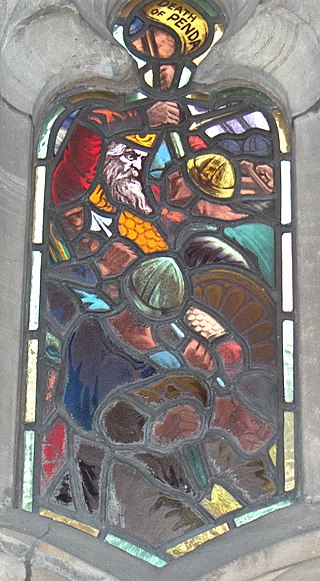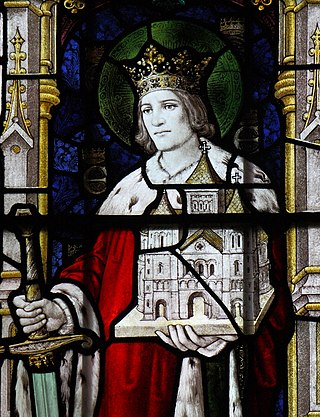Related Research Articles

Oswald was King of Northumbria from 634 until his death, and is venerated as a saint, of whom there was a particular cult in the Middle Ages.

Pope Eleutherius, also known as Eleutherus, was the bishop of Rome from c. 174 to his death. His pontificate is alternatively dated to 171-185 or 177-193. He is venerated as a saint in the Catholic Church.

Geoffrey of Monmouth was a Catholic cleric from Monmouth, Wales, and one of the major figures in the development of British historiography and the popularity of tales of King Arthur. He is best known for his chronicle The History of the Kings of Britain which was widely popular in its day, being translated into other languages from its original Latin. It was given historical credence well into the 16th century, but is now considered historically unreliable.
Oswiu, also known as Oswy or Oswig, was King of Bernicia from 642 and of Northumbria from 654 until his death. He is notable for his role at the Synod of Whitby in 664, which ultimately brought the church in Northumbria into conformity with the wider Catholic Church.

Maelgwn Gwynedd was king of Gwynedd during the early 6th century. Surviving records suggest he held a pre-eminent position among the Brythonic kings in Wales and their allies in the "Old North" along the Scottish coast. Maelgwn was a generous supporter of Christianity, funding the foundation of churches throughout Wales and even far beyond the bounds of his own kingdom. Nonetheless, his principal legacy today is the scathing account of his behavior recorded in De Excidio et Conquestu Britanniae by Gildas, who considered Maelgwn a usurper and reprobate. The son of Cadwallon Lawhir and great-grandson of Cunedda, Maelgwn was buried on Ynys Seiriol, off the eastern tip of Anglesey, having died of the "yellow plague"; quite probably the arrival of Justinian's Plague in Britain.

Æthelred was king of Mercia from 675 until 704. He was the son of Penda of Mercia and came to the throne in 675, when his brother, Wulfhere of Mercia, died from an illness. Within a year of his accession he invaded Kent, where his armies destroyed the city of Rochester. In 679 he defeated his brother-in-law, Ecgfrith of Northumbria, at the Battle of the Trent: the battle was a major setback for the Northumbrians, and effectively ended their military involvement in English affairs south of the Humber. It also permanently returned the kingdom of Lindsey to Mercia's possession. However, Æthelred was unable to re-establish his predecessors' domination of southern Britain.

Penda was a 7th-century king of Mercia, the Anglo-Saxon kingdom in what is today the Midlands. A pagan at a time when Christianity was taking hold in many of the Anglo-Saxon kingdoms, Penda took over the Severn Valley in 628 following the Battle of Cirencester before participating in the defeat of the powerful Northumbrian king Edwin at the Battle of Hatfield Chase in 633.

Edwin, also known as Eadwine or Æduinus, was the King of Deira and Bernicia – which later became known as Northumbria – from about 616 until his death. He converted to Christianity and was baptised in 627. After he fell at the Battle of Hatfield Chase, he was venerated as a saint.
The History of the Britons is a purported history of early Britain written around 828 that survives in numerous recensions from after the 11th century. The Historia Brittonum is commonly attributed to Nennius, as some recensions have a preface written in that name. Some experts have dismissed the Nennian preface as a late forgery and argued that the work was actually an anonymous compilation.
Osric was a King of Deira in northern England. He was a cousin of king Edwin of Northumbria, being the son of Edwin's uncle Æthelric of Deira. Osric was also the father of Oswine.

Cadwallon ap Cadfan was the King of Gwynedd from around 625 until his death in battle. The son and successor of Cadfan ap Iago, he is best remembered as the King of the Britons who invaded and conquered the Kingdom of Northumbria, defeating and killing its king, Edwin, prior to his own death in battle against Oswald of Bernicia. His conquest of Northumbria, which he held for a year or two after Edwin died, made him one of the last recorded Celtic Britons to hold substantial territory in eastern Britain until the rise of the Welsh House of Tudor. He was thereafter remembered as a national hero by the Britons and as a tyrant by the Anglo-Saxons of Northumbria.
Eanfrith (590–634) was briefly King of Bernicia from 633 to 634. His father was Æthelfrith, a Bernician king who had also ruled Deira to the south before being killed in battle around 616 against Raedwald of East Anglia, who had given refuge to Edwin, an exiled prince of Deira. His mother was Acha of Deira.

The Battle of Hatfield Chase was fought on 12 October 633 at Hatfield Chase near Doncaster. It pitted the Northumbrians against an alliance of Gwynedd and Mercia. The Northumbrians were led by Edwin and the Gwynedd-Mercian alliance was led by Cadwallon ap Cadfan and Penda. The site was a marshy area about 8 miles (13 km) northeast of Doncaster on the south bank of the River Don. It was a decisive victory for Gwynedd and the Mercians: Edwin was killed and his army defeated, leading to the temporary collapse of Northumbria.
Cadafael ap Cynfeddw was King of Gwynedd. He came to the throne when his predecessor, King Cadwallon ap Cadfan, was killed in battle, and his primary notability is in having gained the disrespectful sobriquet Cadafael Cadomedd.
Cearl was an early king of Mercia who ruled during the early part of the 7th century, until about 626. He is the first Mercian king mentioned by Bede in his Historia ecclesiastica gentis Anglorum. Bede was a Northumbrian who was hostile to Mercia, and historian Robin Fleming speculates that as "ceorl" means "rustic" in Old English, his name may have been a joke.
Vortimer, also known as Saint Vortimer, is a figure in British tradition, a son of the 5th-century Britonnic ruler Vortigern. He is remembered for his fierce opposition to his father's Saxon allies. In Geoffrey of Monmouth's Historia Regum Britanniae, he overthrows his father and reigns as King of Britain for a brief period before his death restores Vortigern to power.
Cadfan ap Iago was King of Gwynedd. Little is known of the history of Gwynedd from this period, and information about Cadfan and his reign is minimal.
Iago ap Beli was King of Gwynedd. Little is known of him or his kingdom from this early era, with only a few anecdotal mentions of him in historical documents.
Clemen ap Bledric was a 7th-century King of Dumnonia.
According to some early medieval sources, the siege of Exeter or siege of Caer-Uisc was a military conflict that took place in or around 630 CE, between the Mercians, led by Penda of Mercia, and the Britons occupying Caer-Uisc (Exeter) in the kingdom of Dumnonia. Penda is said to have laid siege to the town until the exiled British High King Cadwallon of Gwynedd, arrived to confront him. An alliance between British and Mercian forces followed, secured by Cadwallon's marriage to Alcfrith, Penda's sister, and they marched north to face the armies of Northumbria at the Battle of Cefn Digoll.
References
- ↑ From translation at Wikisource s:History of the Kings of Britain/Giles 1848 Book 12: For there was come to him from Spain a very skilful soothsayer, named Pellitus, who, by the flight of the birds and the courses of the stars, foretold all the disasters that would happen. By these means Edwin, getting knowledge of Cadwalla's return, prepared to meet him, and shattered his ships so that he drowned his men, and beat him off from all his ports.
- ↑ From translation at Wikisource s:History of the Kings of Britain/Giles 1848 Book 12: ...he thrust himself in among the crowd of poor people, in that part where Pellitus was placing them. And the same moment he got access to him, he lifted up his staff, and at once gave him a stab under the breast which killed him.